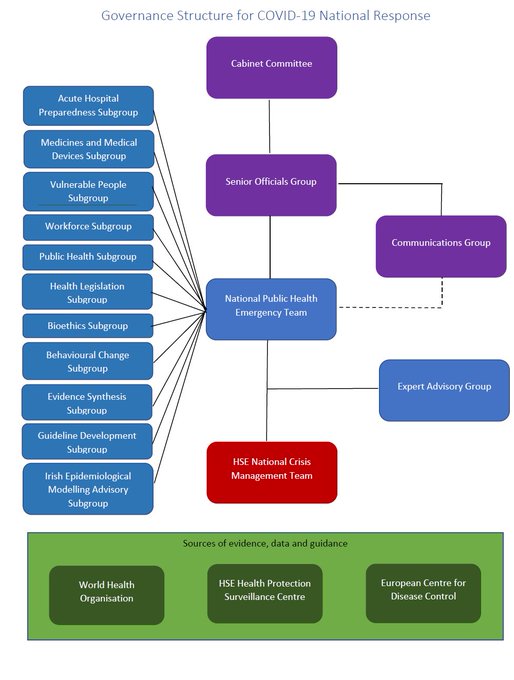The purpose of this post is to briefly provide some background information on the role of behavioural science research in the Irish response to covid.

Relevant to this blog, the response included a subgroup on behavioural change roughly equivalent to the SPI-B group in the UK. The composition of the group is below, and includes academics with backgrounds in behavioural economics, experimental approaches to public policy, social psychology, and health psychology, as well as public servants with experience of rolling out national behavioural change campaigns. The website linked above provides details of the minutes of the meetings, as well as access to papers arising from the group.
The remit of the group, progressed through weekly meetings and ongoing research throughout the time period, is below.
One of the key components of the behavioural response was the work of the ESRI Behavioural Research Unit led by Professor Pete Lunn. Their initial review paper provided a rapid framework for incorporating behavioural literature in the response. Further papers from their group examined a range of questions on issues such as how to best communicate the importance of physical distancing and develop decision aids to support self-isolation, as well as several other relevant topics.
The role of behavioural science in managing systemic risks has been discussed across many forums over the course of the pandemic. My own role was mainly to input on any relevant literature nationally and internationally, input into ongoing survey work, and respond to requests for information along with the rest of the team on ongoing policy issues. I hope to integrate the experience gained into upcoming lectures and discussions on the role of behavioural science in systemic risk and am currently co-ordinating a reading group with students and colleagues on this area. A set of reading lists we maintained at the Geary Institute throughout the period is available here.
The emergence of the covid pandemic in Ireland in late February led to an unprecedented need to change human behaviour across the whole population in a very short period of time. Recommendations from the ECDC and WHO stress the need for physical distancing, hand hygiene, cough and sneeze etiquette, and a range of other measures intended to slow down the spread of the virus and give time for the acute care system and other capacities to develop. In such a context, understanding human behaviour is vital.
A number of disciplines are relevant for studying how people respond to such policies. There are clearly economic issues in how different groups will respond to the incentives involved – the role of the government in replacing income to those being asked to stay away from their workplace is clearly of relevance. The discipline of behavioural economics has stressed that people may also be heavily impacted by how these incentives are communicated and designed in terms of complexity, something that has been particularly relevant. As well as incentives, people’s understanding of the restrictions and their reaction to communication is also clearly important. Disciplines such as health psychology and behavioural medicine examine in detail how people behave with regard to their health. Such disciplines are highly relevant for how to design health communications and understand the wider determinants of health behaviours. Social psychology has been particularly useful in understanding collective action and how people’s behaviour is shaped by their expectations of others and by norms more generally. The phrase “behavioural science” can sometimes be confusing but it provides a useful way of summarising the fact that many disciplines relevant to human behaviour work on these questions in overlapping but often subtly different ways.
The Irish public health emergency team NPHET has drawn from the behavioural sciences in a number of ways. In particular, the behavioural change subgroup draws from expertise from the ESRI Behavioural Research Unit, the UCD Geary Institute, UL Department of Psychology, NUIG Health Behaviour Change group, as well as experts in behavioural change from across the Irish government. Such input has included providing recommendations on health communications, alterations to physical choice architecture, and understanding of public behaviours.
As part of the Geary Institute contribution, we have been compiling resources from the behavioural sciences relevant to covid. We have gathered these into two open google documents: Useful Resources on COVID and Behavioural Science and Behavioural Science and Covid Resources: Part 2.
The first document provides a wide range of general resources on behavioural science and covid, including some of the key behavioural models, and the first early review papers. It provides links to some of the core frameworks in behavioural science applications, such as the Behavioural Change Wheel. The review by Lunn et al (2020) in the Journal of Behavioural Policy Administration provides a particularly useful resource summarising the key themes in the application of behavioural science to covid response. We also provide links to ongoing survey research programmes in this area.
The second document provides key literature across some of the key questions that will be addressed on infection control policies from a behavioural perspective. We include resources across a range of topics relevant to ongoing policies in these areas, including mental health effects, covid health literacy, physical distancing supports, public attitudes, stigma, ancillary behaviours, healthcare utilisation, and other topics. It is clear that the evolving situation creates a huge demand for evidence across a range of emerging issues. We will use this document to keep track of useful papers emerging but each of these areas will require very detailed consideration well beyond what can be summarised in such a list.
These documents are intended to act as a useful source of information for our policy research community. They are not intended to act as recommendations or be prescriptive. We welcome suggestions and we will be updating the second document continuously throughout the next few months to point to useful research being conducted in Ireland and throughout the world.
No comments:
Post a Comment